We’ve completed our second full rotation of the twelve classes in the Player’s Handbook, not to mention taken a deep dive into the first 5 levels of D&D’s thirteenth class, the inventive and arcane Artificer! This wave of the Class 101 series will appraise every subclass within the Player’s Handbook and break down each subclass’s strengths, weaknesses, thematic elements, and everything else a player would want to know before playing that subclass. Because of this, you will need to own the Player’s Handbook (or purchase the subclass a la carte on the Marketplace) in order to make full use of this series.
Check out the other guides in the Class 101 series, like the broad overview of the wizard class in Wizard 101: A Beginner’s Guide to the Arcane Arts, Wizard 101: School of Evocation, and Wizard 101: School of Abjuration. If you’re interested in playing other classes, check out the entire Class 101 series.
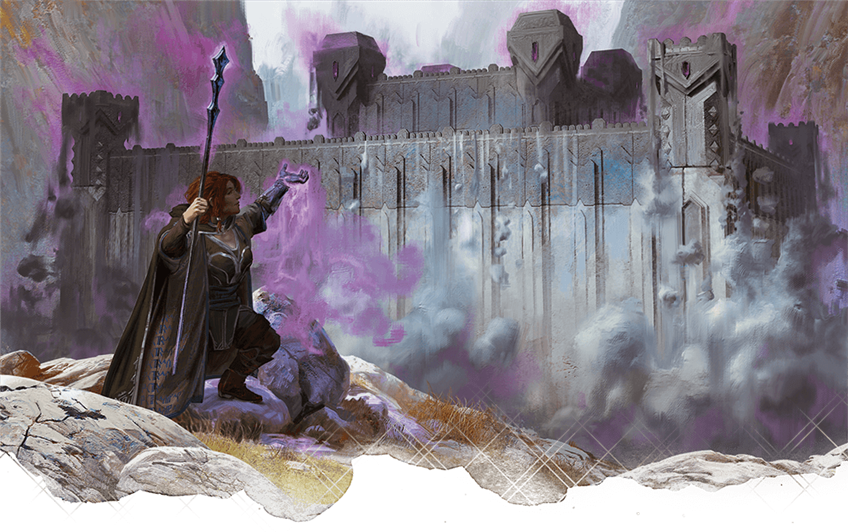
Story of the School of Conjuration
“What are you looking for?” A black-robed pupil, gaunt-faced and dark-eyed from lack of sleep, walked through rows of bookshelves, and looked up at a friend, a fellow pupil, who stood on the top rung of a rolling ladder attached to one of the shelves. The other pupil, swimming in ill-fitting orange robes, ran her finger along the spines of the leather bound tomes on the top shelf.
“A Catalogue of Lesser Elementals, Volume One, have you ever read it?” the other pupil responded. Sewn upon her robes was a symbol like an inverted A, with a wavy line cutting through the triangle—the magical glyph of conjuration.
The other pupil, whose black robes bore the omega-like glyph of necromancy, shook his head. “Ought I to have? Elementals play precious little role in my studies.”
“Oh, you’re useless,” the conjurer sighed, a hint of playfulness twinkling in her tone of frustration.
“You’re not going to do anything stupid with it, if you get it?” the necromancer said dully. “Because… I picked up a new divination over the weekend. I could help find it, if—”
“Would you?” The conjurer looked sharply over her shoulder, beaming at her friend. She turned with such force that she practically slipped from the ladder. She gasped as her foot slipped from the rung, then took a sharp breath in as she stabilized herself. The necromancer took a step forward, his hands open, grimacing, as he tried to remember if he’d prepared feather fall that morning. The conjurer laughed sheepishly. “I’m fine, I’m fine… but, seriously, would you?”
“If,” the necromancer continued unsteadily, “if you promise you’re not going to conjure another cloud of steam mephits in my dorm again. Half my spellbook’s pages are still wrinkled.”
“I’m not looking for little mephits,” the conjurer said, returning to scanning the spines of books. “An azer… I’ve always wanted to speak with an azer. They’re intelligent, skillful, they live on the Elemental Plane of Fire! They—!”
“Please spare me your effusiveness,” the necromancer sighed, though he couldn’t conceal the glint of excitement in his eyes at the thought of watching the illicit summoning an extraplanar being. And an intelligent one at that. “Fine, I’ll do it.” He left aloft his arcane focus, a silver key with a skull at the tip, and muttered an incantation, then spoke aloud the name of the tome. A flash of insight entered the wizard’s mind, and he pointed at the middle of a shelf three rows down. “The book you seek… it’s there.”
“Yes!” the conjurer whooped, and vanished in a cloud of silvery mist, appearing seconds later at the point the necromancer had gestured to. Another group of arcane pupils squeaked in surprise as the conjurer appeared among them, and fled the aisle. The necromancer smiled. His friend would get them into trouble again, he was certain, but it would be worth it.
School of Conjuration Features
Conjurers are talented practitioners of the magic of summoning and creation, through which they can transport items and creatures, or even create matter or energy out of thin air. The wizard gains five subclass features at 2nd, 6th, 10th, and 14th level. You can read all of the School of Abjuration features in the Player’s Handbook. In summary, your subclass features allow you to:
- Study conjuration spells more efficiently, halving the time and cost of copying such spells into your spellbook
- Temporarily create objects out of raw magic
- Teleport within 30 feet, or swap places with another willing creature
- Maintain perfect concentration on your conjuration spells
- Grant your conjured creatures additional durability
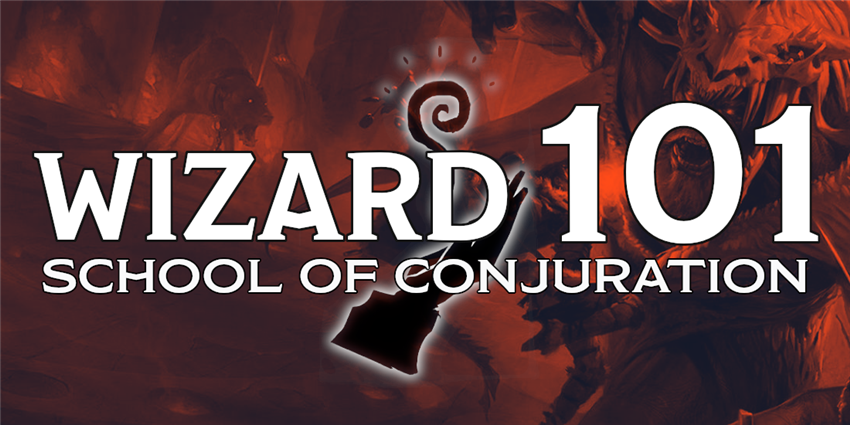
Benefits of the School of Conjuration
Conjuration magic is available to all wizards, but those wizards who specifically study this spell school’s intricacies can enhance their conjurations in ways other spellcasters can only dream of. These benefits, such as being unable to lose concentration on conjuration spells, and giving summoned creatures additional hit points, make you the undisputed master of conjuration spells. Other wizards might be able to use the same spells as you, but they’ll never be quite as good as you at them.
Your earlier class features, such as Minor Conjuration and Benign Teleportation, aren’t raw upgrades to your spells in the way that your higher-level features are, but they’re useful at reinforcing the flavor of your class. Conjuration is about both creation and transportation, and these two features nail those aspects of the conjurer class fantasy. Minor Conjuration is a fun way to solve problems by conjuring a tool that will let you use an imaginative solution. You could conjure a crowbar to pry open a stuck door, a shortsword for a disarmed fighter, a set of thieves’ tools for a rogue who’s lost their lockpicks, a padlock to secure a door, a locket with a secret compartment to hide a letter, or whatever else you can think of.
Your Benign Transposition feature also has a number of applications, combat and while exploring—and with some creative thinking, maybe even in social scenarios. Being able to swap places with your fighter companion when you’re caught off guard by an ambush is fantastic. Casting fly on yourself and using that spell in conjunction with this feature to ferry a friend across a dangerous chasm is useful, too! Get creative with this feature, though do be mindful of its 30-foot range and its once-per-long-rest restriction, though even that is malleable, as long as you’re casting lots of conjuration spells.
Drawbacks of the School of Conjuration
One of the great drawbacks of specializing in conjuration spells is that so many spells in that school require your concentration. Your ability to only concentrate on a single spell at a time isn’t too oppressive at low levels, since there are quite a few useful spells like grease, find familiar, and misty step which don’t require concentration. However, as you gain levels, you’ll find that your most exciting spells, particularly those which summon creatures to fight for you, all demand your precious concentration slot.
Your Focused Conjuration feature, which prevents your concentration on conjuration spells from being broken when you take damage, helps keep your summoned creatures from disappearing in the heat of combat because you lost concentration, but it does little to ease the pain of only being able to focus on one powerful conjuration spell at a time.
If you plan on playing a School of Conjuration wizard, be sure to take some spells outside of your school of focus. While you want to have a plentiful supply of conjuration spells to refresh your Benign Transposition feature, and to benefit from your Focused Conjuration feature, don’t forget to carry a diverse toolkit of spells. While being powerful within your niche is a good quality for any wizard to have, the real strength of your class is having the right tool for any occasion—and overloading your prepared spell list with too many summoning spells will make it hard for you to be flexible.
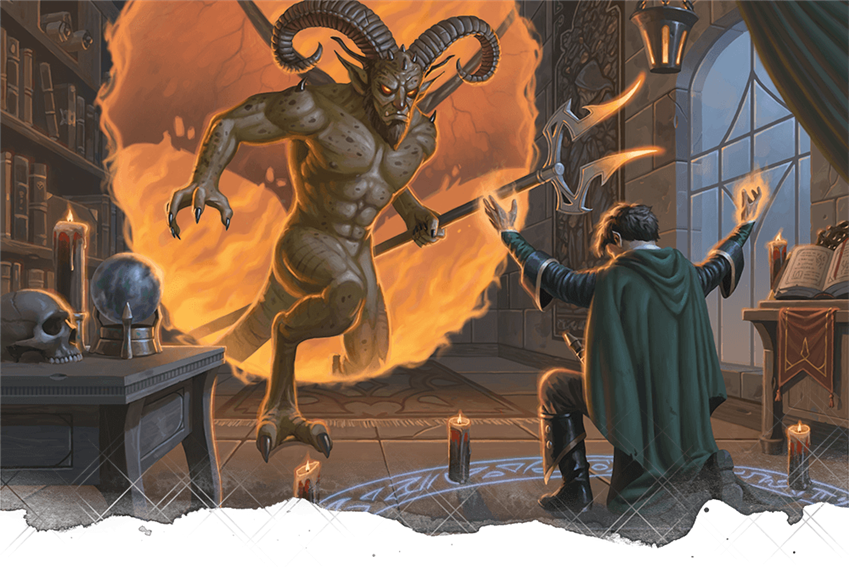
Suggested Build
As a wizard, you choose your Arcane Tradition at 2nd level. This gives you a little bit of time to feel out what you want your playstyle to be before you select your preferred subclass. You may find that your spells feel a little lackluster at 1st level, since you only have two 1st-level spell slots to use before falling back on your cantrips. Even using your Arcane Recovery feature to get one 1st-level slot back during a short rest, your cantrips may seem like they’re the star of the show. That’s fine! As you gain levels, you’ll gain more and more spell slots, and in time you won’t have to fall back on simple cantrips.
You should choose a race that improves your Intelligence score, and either your Dexterity or Constitution scores. As a wizard, Intelligence is your most important ability. Your spells are powered by your own knowledge of the arcane workings of magic, and improving this understanding makes it easier for you to hit with spell attacks and harder for enemies to save against your spells. As such, gnomes make fantastic wizards, as their innate intellect makes them natural studies. High elves also make excellent wizards, as they gain a natural bonus to both Dexterity and Intelligence, and also grant you an extra cantrip. Variant humans also have a good time as wizards; gaining a free feat is nothing to sneeze at.
Choose EQUIPMENT instead of GOLD at the end of character creation. Since you’ll probably be choosing at least one ranged damage-dealing cantrip, you can take a quarterstaff so that you have a little bit of protection up-close. Choosing a component pouch or an arcane focus is a purely aesthetic choice, and choosing a scholar’s or an explorer’s pack is a fairly insignificant decision. A scholar’s pack will be useful in a more city-based campaign, but if you plan on traveling cross-country, then an explorer’s pack is the superior choice.
Spells
Wizards can copy so many spells into their spellbook that you don’t have to be too choosey when selecting your spells at each level. Nevertheless, it couldn’t hurt to make very clear choices, especially if your DM doesn’t give out a lot of spell scrolls to copy, or doesn’t pit you against many other enemy wizards with spellbooks to steal. As a 1st-level wizard, your spellbook starts with six spells in it, and you can prepare a number of spells equal to Intelligence modifier + your wizard level (minimum of one spell). Don’t forget that all of these spells must come from the wizard spell list. You also start play with 3 cantrips, also from the wizard spell list. You gain two new wizard spells every level, and you also gain new cantrips from time to time, so keep an eye on the Wizard Table when you gain a new level.
As a conjurer, you’ll want at least two spells marked DEFENSE, one spell marked either OFFENSE, and one spell marked either SOCIAL or SUPPORT, depending on how you want to play your character. Spells on this list from the conjuration school are also noted, since they can be used to refresh your Benign Transposition feature, starting at 6th level.
Note that this list only includes some spells from the Player's Handbook, so if you want to choose more unusual spells, or have other sources like Xanathar's Guide to Everything, you'll have to do a little self-directed research. This list is just here to get you started if this is your first time playing a conjurer.
- Burning hands (OFFENSE)
- Charm person (SOCIAL)
- Detect magic (EXPLORATION)
- Disguise self (SOCIAL)
- Fog cloud (DEFENSE; conjuration)
- Find familiar (OFFENSE/EXPLORATION; conjuration)
- Mage armor (DEFENSE)
- Grease (DEFENSE; conjuration)
- Thunderwave (OFFENSE)

Feats
Once you’ve improved your Intelligence score to 18 or 20, you can increase your power with a few useful feats. The following feats are good picks for School of Conjuration wizards, and will improve your reliability in your own desired area of expertise:
Conjurers don’t have any feats that they desperately want, so focus mainly on improving your Intelligence score. Some feats like Keen Mind, Linguist, and Observant can give you a fun character quirk while still giving you a minor boost to your Intelligence, but don’t pick these unless they support your character concept.
If you want more advice for building a wizard, check out Wizard 101. Have you ever played a School of Conjuration wizard? What advice would you give to players that want to play this subclass? Join us next week as we begin a new slate of Class 101 articles in Artificer 101: Alchemist!
Create A Brand-New Adventurer Acquire New Powers and Adventures Browse All Your D&D Content
 James Haeck is the lead writer for D&D Beyond, the co-author of Waterdeep: Dragon Heist, Baldur's Gate: Descent into Avernus, and the Critical Role Explorer's Guide to Wildemount, a member of the Guild Adepts, and a freelance writer for Wizards of the Coast, the D&D Adventurers League, and other RPG companies. He lives in Seattle, Washington with his fiancée Hannah and their animal companions Mei and Marzipan. You can find him wasting time on Twitter at @jamesjhaeck.
James Haeck is the lead writer for D&D Beyond, the co-author of Waterdeep: Dragon Heist, Baldur's Gate: Descent into Avernus, and the Critical Role Explorer's Guide to Wildemount, a member of the Guild Adepts, and a freelance writer for Wizards of the Coast, the D&D Adventurers League, and other RPG companies. He lives in Seattle, Washington with his fiancée Hannah and their animal companions Mei and Marzipan. You can find him wasting time on Twitter at @jamesjhaeck.








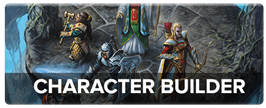
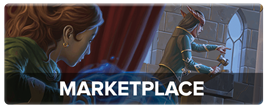
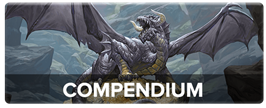
-
View User Profile
-
Send Message
Posted Nov 9, 2020Thanks! What are you guys favorite use of minor conjuration?
-
View User Profile
-
Send Message
Posted Nov 9, 2020Second!
I have actually never used minor conjuration.
-
View User Profile
-
Send Message
Posted Nov 9, 2020Third!
I have never really played a conjurer.
-
View User Profile
-
Send Message
Posted Nov 9, 2020minor conjuration is such a fun ability, especially on a trickster character, conjuring expensive gems to scam a shopkeep, conjuring 10 pound weights to drop it on someone's head, the possibilities are endless.
-
View User Profile
-
Send Message
Posted Nov 9, 2020I really like how the "the story of" sections in these articles has been mostly based on young characters this time around. the articles are getting a little stale though.
-
View User Profile
-
Send Message
Posted Nov 9, 2020Careful Wizard 101 is trademarked by Kings Isle.
-
View User Profile
-
Send Message
Posted Nov 9, 2020Pad Locks and door stoppers. If we’re breaking into a place I’ll make sure to secure the door behind us so nobody just walks in on our rear. My fav thing so far was making a crucible to hold molten iron and then making it disappear and letting the contents fall on some guys trying to break into a fort.
-
View User Profile
-
Send Message
Posted Nov 9, 2020"Minor Conjuration is a fun way to solve problems by conjuring a tool that will let you use an imaginative solution. You could conjure a crowbar to pry open a stuck door, a shortsword for a disarmed fighter, a set of thieves’ tools for a rogue who’s lost their lockpicks, a padlock to secure a door, a locket with a secret compartment to hide a letter, or whatever else you can think of."
How do I go about doing this? I don't see anything on the spell list for these types of conjurations, but maybe I am just missing it?
Edit: I see now that this is a class feature for the Conjuration school.
-
View User Profile
-
Send Message
Posted Nov 9, 2020@James Haeck, I suggest linking somewhere the good article you wrote a while back about conjuration spells (e.g. conjure animals), and how to handle them (mob rules, etc.)
Sly Flourish's Mob Damage Calculator is also a good tool to share with players that use conjure X spells.
-
View User Profile
-
Send Message
Posted Nov 9, 2020I would love to learn about the school of necromancy next if we haven't already
-
View User Profile
-
Send Message
Posted Nov 9, 2020My longest running character has been a Loxodon Demonologist conjurer and I love it. After a very long time he has finally managed to amass enough resources to summon a Shoosuva and bind it with planar binding.
She’s called Penelope.
-
View User Profile
-
Send Message
Posted Nov 10, 2020Except that the item made with Minor Conjuration disappears with it deals or takes damage and a set of thieves' tools are multiple items so that wouldn't fly unless your DM is generous enough to regard a tool as listed in the books as just 1 item.
And I'd wager that Conjurers are the only class who would ever pick the otherwise useless Keen Mind feat (after maxing out INT) because of the final line:
- You can accurately recall anything you have seen or heard within the past month.
(but even then, the entire Keen Mind feat can be replicated by just keeping good notes)
-
View User Profile
-
Send Message
Posted Nov 10, 2020You mean Keen Mind, right? Observant's the one that boosts passive Perception/Investigation and allows for lip reading.
-
View User Profile
-
Send Message
Posted Nov 10, 2020It's a bit of an issue for classes like wizards, when their subclasses don't really change the gist of what they're going to be doing most of the time.
-
View User Profile
-
Send Message
Posted Nov 10, 2020Found a little typo :) Great article. Haven't played a conjurer myself, but I love these Class 101 posts and am always recommending them to my players!
-
View User Profile
-
Send Message
Posted Nov 10, 2020I played a conjuration wizard a few years ago(level 1-17). It was a blast. I never had to walk anywhere, I just conjured a little wheelie platform and had my familiar pull me around.
The character was definitely a great support character, I used spells like wall of sand, and stone to keep the enemies on the fighter, and off of me.
The BBEG for that adventure was a high level way of shadows monk, so the ability to use benign teleport to misty step to keep bouncing out of danger, or over to the tank to use healing was great. (I think I had some homebrew healing as BA item)
I've played divination before and while conjuration wasn't has powerful I enjoyed it more.
-
View User Profile
-
Send Message
Posted Nov 10, 2020Next time I play conjuration wizard, I am definitely going to do that.
-
View User Profile
-
Send Message
Posted Nov 10, 2020Me too, but that’s probably going to take a while if they go in alphabetical order.
-
View User Profile
-
Send Message
Posted Nov 10, 2020Just because you as a player wrote something down doesn't mean that your character remembers it. Granted not many DM's challenge this, but they really should by having characters make history checks for details that a character may not recall.
Even so, being able to recall something accurately has other interesting uses; with Minor Conjuration it gives you the ability to accurately recreate an object that you've seen, such as a key to a particular door, a painting etc., which you might otherwise have to roll for to see if you can get it right (if the DM allows it at all). With Keen Mind you can argue these things, and they're a perfectly valid use of Minor Conjuration.
I would also say that while you're right that a minor conjured weapon is only single use, I would say thieves' tools should be fine; the tools as a set are a single object within the stated limits, and the feature places no emphasis on the concept of component parts. In general most things you can take as equipment are single objects, with the exception of an adventuring pack, though even then, when closed you can argue it (with all its contents) is a single object for targeting purposes, so could potentially be argued for a conjuration. Besides which, all a good thief really needs is the lockpick anyway. 😉
Regarding spell choice in the article; I probably wouldn't take both Burning Hands and Thunderwave, I'd definitely consider Ice Knife as a main offensive spell since it's a Conjuration spell and does similar damage. While it uses an attack roll, that's only for the piercing damage, the cold damage is a save and it has good range. Unseen Servant is also a fun one if you're creative with it (for fetching, distractions etc.). Misty Step, Thunder Step and Dimension Door are all favourites of mine for teleporting; the latter for distance, the former for the bonus action economy, and Thunder Step for the sonic boom.
-
View User Profile
-
Send Message
Posted Nov 10, 2020yeah... These most recent ones seem super short...